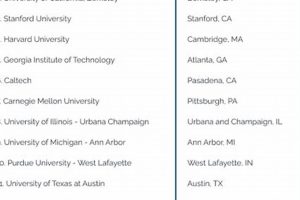Top-tier institutions for undergraduate biology programs offer rigorous curricula, cutting-edge research opportunities, and experienced faculty. These programs often feature specialized tracks, such as ecology, genetics, or microbiology, allowing students to tailor their education to specific interests. For instance, some institutions may offer access to advanced laboratory equipment, collaborations with nearby medical facilities, or fieldwork experiences in diverse ecosystems.
A strong foundation in biology from a reputable institution opens doors to a wide range of careers, from medicine and research to environmental conservation and biotechnology. Historically, breakthroughs in fields like genetics, medicine, and agriculture have stemmed from research conducted within university biology departments, highlighting the crucial role these institutions play in scientific advancement. Choosing a high-quality undergraduate program can significantly impact a student’s future career trajectory and contribution to the scientific community.
This discussion will explore key factors to consider when evaluating undergraduate biology programs, including faculty expertise, research facilities, and career support services. It will also delve into specific examples of institutions renowned for their biology programs and highlight the unique strengths of each.
Tips for Selecting a Top Undergraduate Biology Program
Choosing the right undergraduate biology program is crucial for academic success and future career prospects. The following tips offer guidance for navigating this important decision.
Tip 1: Investigate Faculty Research. Explore faculty profiles and recent publications to identify programs with active research in areas of interest. Look for opportunities for undergraduate involvement in research projects.
Tip 2: Assess Laboratory Facilities. Modern, well-equipped laboratories are essential for a high-quality biology education. Consider the availability of specialized equipment and resources relevant to specific fields of study.
Tip 3: Explore Curricular Flexibility. A flexible curriculum allows students to tailor their coursework to individual interests and career goals. Look for programs offering diverse electives and opportunities for specialization.
Tip 4: Consider Career Support Services. Strong career advising and internship opportunities can significantly enhance post-graduate prospects. Investigate the resources available to support students in their career exploration and development.
Tip 5: Evaluate Institutional Resources. Beyond the biology department, consider the overall resources and support offered by the institution, such as libraries, computing facilities, and student support services.
Tip 6: Examine Program Size and Structure. Reflect on whether a smaller, more intimate program or a larger program with more diverse offerings better suits individual learning preferences and needs.
Tip 7: Consider Location and Environment. The institution’s location can influence access to internships, research collaborations, and overall learning experience. Evaluate whether an urban, suburban, or rural setting aligns with individual preferences.
By carefully considering these factors, prospective students can identify programs that align with their academic aspirations and career goals, setting the stage for a successful and rewarding educational experience.
These insights provide a framework for making informed decisions about undergraduate biology education, paving the way for a fulfilling career in the biological sciences.
1. Faculty Expertise
Faculty expertise is a cornerstone of highly-ranked undergraduate biology programs. Distinguished faculty members not only impart fundamental biological principles but also foster critical thinking, inspire scientific inquiry, and provide invaluable mentorship. The quality and depth of faculty expertise directly influence the caliber of education and research opportunities available to students.
- Research Accomplishments and Recognition:
Institutions with leading biology programs often boast faculty with extensive publication records in reputable scientific journals, presentations at international conferences, and prestigious awards recognizing their contributions to the field. This active involvement in cutting-edge research translates to a dynamic learning environment where students are exposed to the latest discoveries and methodologies. For example, a professor actively publishing research on gene editing technologies can provide students with unparalleled insights into this rapidly evolving field.
- Mentorship and Advising:
Leading biology programs prioritize faculty mentorship, providing students with individualized guidance and support throughout their academic journey. Experienced faculty advisors help students navigate course selection, research opportunities, and career paths. This personalized attention is instrumental in fostering student success and shaping future scientific careers. Close interaction with faculty also provides opportunities for students to develop crucial professional skills, such as grant writing and scientific communication.
- Diversity of Specialization:
Top biology programs often feature faculty with diverse specializations across the biological sciences, from molecular biology and genetics to ecology and evolutionary biology. This breadth of expertise allows students to explore a wide range of biological subdisciplines and tailor their education to specific interests. Exposure to diverse perspectives enriches the learning experience and fosters interdisciplinary thinking, crucial for addressing complex biological challenges.
- Teaching Excellence:
While research prowess is essential, effective teaching is equally critical in top biology programs. Excellent instructors employ engaging pedagogical approaches, fostering a stimulating learning environment that promotes critical thinking, problem-solving, and a deep understanding of biological concepts. This commitment to high-quality teaching ensures that students develop a strong foundation in biological principles and are well-prepared for future endeavors in research, medicine, or related fields. A professor who excels at explaining complex concepts and fostering classroom discussion can significantly impact a student’s understanding and appreciation of biology.
The collective expertise of the faculty significantly shapes the academic rigor, research opportunities, and overall quality of a biology program. Institutions with strong faculty expertise cultivate an environment where students can thrive intellectually and develop the skills necessary for successful careers in the biological sciences and beyond. This focus on faculty excellence directly correlates with institutional rankings and reputation within the scientific community.
2. Research Opportunities
A hallmark of top undergraduate biology programs is the readily available access to substantial research opportunities. These experiences provide students with practical skills, foster critical thinking, and offer invaluable exposure to the scientific process. Institutions recognized for excellence in biology education often prioritize research integration within the undergraduate curriculum, cultivating an environment where inquiry-driven learning thrives. Such opportunities allow students to move beyond textbook knowledge, applying theoretical concepts to real-world research questions and contributing to ongoing scientific investigations. For instance, a student might participate in a research project investigating the effects of climate change on local ecosystems, gaining hands-on experience with data collection, analysis, and interpretation.
The benefits of undergraduate research extend beyond skill development. Active participation in research fosters collaboration with faculty and peers, cultivates scientific communication skills through presentations and publications, and strengthens students’ understanding of the scientific landscape. Moreover, early research experience can significantly enhance applications to graduate programs and professional schools, signaling a student’s commitment to scientific inquiry and capacity for independent research. Examples include presenting research findings at national conferences, co-authoring publications in peer-reviewed journals, or securing competitive summer research internships at prestigious institutions. These achievements not only enrich a student’s undergraduate experience but also provide a competitive edge in pursuing future career goals.
In summary, the availability and quality of research opportunities serve as a critical differentiator among undergraduate biology programs. Institutions that prioritize research integration cultivate an environment of active learning, skill development, and scientific discovery, ultimately preparing students for successful careers in research, medicine, and related fields. By fostering a culture of inquiry and providing the necessary resources and mentorship, these institutions empower the next generation of scientists and contribute to the advancement of biological knowledge. The strength of a program’s research infrastructure often directly correlates with its overall ranking and reputation, highlighting the integral role of research in shaping high-quality biology education.
3. Cutting-Edge Facilities
State-of-the-art facilities are essential for a high-quality undergraduate biology education. Top-tier biology programs invest in advanced equipment and resources that provide students with hands-on experience using the latest technologies. This access to cutting-edge facilities allows students to develop practical skills, conduct sophisticated experiments, and engage in research alongside experienced faculty. The quality of facilities directly impacts the type of research conducted, the depth of student learning, and the overall preparedness of graduates entering the scientific workforce or pursuing advanced studies.
- Advanced Microscopy and Imaging:
Access to sophisticated microscopy tools, such as confocal and electron microscopes, is crucial for visualizing cellular structures and processes at high resolution. These instruments enable students to explore the intricacies of biological systems, from the molecular level to the organization of tissues and organs. For example, students might utilize confocal microscopy to observe the dynamic interactions of proteins within living cells, gaining insights into fundamental biological processes. Such experiences are invaluable in preparing students for research careers in cell biology, developmental biology, and related fields.
- Genomics and Proteomics Equipment:
Modern biology relies heavily on genomic and proteomic analyses. Leading biology programs offer access to cutting-edge equipment for DNA sequencing, gene expression analysis, and protein characterization. These tools allow students to explore the genetic basis of biological phenomena, investigate gene function, and analyze protein interactions. For instance, students might utilize next-generation sequencing technologies to study the genetic diversity of a population or analyze gene expression changes in response to environmental stimuli. These experiences provide valuable training in bioinformatics and data analysis, skills highly sought after in the biotechnology and pharmaceutical industries.
- Specialized Laboratories and Core Facilities:
Top biology programs often house specialized laboratories dedicated to specific research areas, such as neuroscience, plant biology, or microbiology. These dedicated spaces provide tailored resources and equipment for advanced research projects. Core facilities offering services like flow cytometry, mass spectrometry, and bioimaging support a wide range of research endeavors and provide students with access to sophisticated technologies. For example, a dedicated neuroscience laboratory might house equipment for electrophysiology experiments, while a plant biology laboratory might contain specialized growth chambers and equipment for analyzing plant physiology. Access to these specialized resources enhances the depth and breadth of research opportunities available to undergraduates.
- Modern Computing Resources and Software:
Biological research increasingly relies on computational tools for data analysis, modeling, and simulation. Top programs provide access to high-performance computing clusters, specialized software for bioinformatics and statistical analysis, and dedicated support staff to assist with computational tasks. This computational infrastructure enables students to analyze large datasets, develop computational models of biological systems, and apply bioinformatics tools to address complex research questions. This training in computational biology is essential for preparing students for the evolving landscape of biological research and related career paths.
The availability of cutting-edge facilities directly contributes to the overall quality and reputation of undergraduate biology programs. Institutions that invest in state-of-the-art equipment and resources create an environment conducive to innovative research, hands-on learning, and the development of essential skills for future success in the biological sciences. This commitment to providing advanced facilities enhances the educational experience and distinguishes leading biology programs from their peers, impacting both student outcomes and institutional prestige.
4. Comprehensive Curriculum
A comprehensive curriculum is a defining characteristic of top biology undergraduate programs. These programs offer a broad foundation in biological principles while also providing opportunities for specialization and in-depth exploration of specific areas of interest. A well-structured curriculum ensures students develop a deep understanding of core concepts, acquire essential laboratory skills, and gain exposure to diverse perspectives within the biological sciences. This breadth and depth of knowledge are crucial for success in a rapidly evolving field and prepare graduates for diverse career paths, from research and medicine to environmental conservation and biotechnology.
- Foundational Coursework:
A strong foundation in fundamental biological principles is essential for all biology majors. Comprehensive curricula typically include rigorous coursework in cell biology, genetics, molecular biology, organismal biology, and ecology. These core courses provide students with a broad understanding of the fundamental principles governing life processes, from the molecular level to ecosystem dynamics. For example, a thorough understanding of genetics is crucial for students interested in pursuing careers in genetic counseling, biotechnology, or biomedical research.
- Specialized Electives:
While a strong foundation is essential, top biology programs also offer a diverse array of specialized electives, allowing students to tailor their education to specific interests. These electives may cover topics such as neurobiology, immunology, developmental biology, marine biology, or bioinformatics. The availability of specialized coursework allows students to delve deeper into specific subdisciplines, gaining advanced knowledge and skills relevant to their chosen career paths. For instance, a student interested in pursuing medical school might choose electives in human anatomy and physiology, while a student interested in environmental conservation might opt for courses in conservation biology and ecological restoration.
- Laboratory and Fieldwork Experiences:
Hands-on experience is critical for developing practical skills and a deep understanding of biological concepts. Comprehensive curricula incorporate extensive laboratory coursework and often include opportunities for fieldwork. Laboratory courses provide students with training in experimental design, data collection and analysis, and the use of specialized equipment. Fieldwork experiences offer opportunities to study organisms and ecosystems in their natural environments, fostering a deeper appreciation for the complexity of biological systems. For example, a field ecology course might involve conducting biodiversity surveys in a local forest, while a molecular biology lab might focus on techniques for gene cloning and expression analysis.
- Interdisciplinary Connections:
Biology is an inherently interdisciplinary field, with connections to chemistry, physics, mathematics, and computer science. Leading biology programs recognize the importance of interdisciplinary training and offer opportunities for students to integrate knowledge from other disciplines. This interdisciplinary approach prepares students to address complex biological problems from multiple perspectives and fosters critical thinking skills essential for success in research and other scientific careers. For example, a student interested in bioinformatics might combine coursework in biology with courses in computer science and statistics, gaining the skills necessary to analyze large biological datasets and develop computational models.
A comprehensive curriculum, encompassing both breadth and depth of knowledge, is a hallmark of top biology undergraduate programs. By providing a strong foundation in core principles, opportunities for specialization, hands-on experiences, and interdisciplinary connections, these programs prepare graduates for a wide range of careers in the biological sciences and beyond. The rigor and comprehensiveness of the curriculum directly contribute to a program’s reputation and ranking, signifying a commitment to providing students with the knowledge and skills necessary to thrive in a dynamic and evolving field.
5. Career Support Services
Robust career support services are a critical component of top-tier biology undergraduate programs. These services play a vital role in connecting students with opportunities that align with their career aspirations, facilitating a smooth transition from academic study to professional practice. Institutions recognized for excellence in biology education often invest significantly in comprehensive career services, understanding the crucial link between academic preparation and successful career outcomes. This investment translates into a range of resources designed to equip students with the skills and connections needed to thrive in the competitive landscape of biological sciences careers. For example, a dedicated career advisor within the biology department can provide personalized guidance on career paths, resume and cover letter writing, interview skills, and networking strategies. This tailored support helps students articulate their skills and experiences effectively, increasing their competitiveness in the job market or when applying to graduate or professional programs.
The impact of effective career support services extends beyond job placement. These services often facilitate access to internships and research experiences, providing students with valuable practical training and networking opportunities. Workshops focused on scientific communication, grant writing, and career exploration further enhance students’ professional development. Furthermore, strong connections with alumni networks and industry partners can create a pipeline of opportunities for graduating students. For instance, institutions with established partnerships with biotechnology companies or research hospitals can offer students preferential access to internships or research positions, providing a direct pathway to future employment. Similarly, alumni networks can provide mentorship, career insights, and potential job leads, further strengthening the link between academic training and professional success.
In conclusion, comprehensive career support services are an integral part of what defines the best biology major schools. By providing tailored guidance, practical training, and access to professional networks, these services empower students to translate their academic achievements into successful and fulfilling careers. The strength of career support often directly correlates with the reputation and ranking of a biology program, highlighting the importance of these services in shaping student outcomes and contributing to the overall excellence of the institution. The long-term success of graduates reflects positively on the program, reinforcing its reputation and attracting future generations of aspiring biologists. Institutions that prioritize career development demonstrate a commitment to not only educating students but also equipping them with the tools they need to thrive in their chosen careers, contributing to the overall advancement of the biological sciences.
6. Alumni Network Strength
A robust and engaged alumni network is a significant indicator of a successful biology program and often distinguishes the best biology major schools. A strong alumni network provides tangible benefits to current students, contributing to their professional development and enhancing the overall reputation of the institution. The network’s strength reflects the program’s ability to cultivate not only skilled biologists but also individuals who remain invested in the program’s continued success. This connection creates a reciprocal relationship where established alumni contribute to the growth and development of future generations of biologists, fostering a cycle of excellence.
- Mentorship and Networking:
Active alumni networks offer invaluable mentorship opportunities for current students. Experienced alumni working in diverse fields can provide career guidance, share industry insights, and offer advice on navigating the challenges of professional life. These connections can be instrumental in helping students define career paths, refine job search strategies, and gain access to internships or job opportunities. For instance, an alumnus working in a pharmaceutical research lab might mentor a student interested in drug development, offering insights into the required skills and the industry’s current landscape.
- Career Development Resources:
Alumni networks often contribute significantly to career development resources, including workshops, networking events, and career fairs specifically tailored to biology graduates. These resources can provide valuable training in resume writing, interview techniques, and professional networking, equipping students with the tools they need to succeed in the competitive job market. Alumni may also participate in mock interviews or resume review sessions, providing personalized feedback and guidance to help students refine their job search materials and prepare for interviews. These focused resources complement the institution’s broader career services, providing a targeted approach to career development within the field of biology.
- Internship and Job Opportunities:
Established alumni working in various sectors can create a pipeline of internship and job opportunities for graduating students. Alumni often serve as recruiters for their organizations, actively seeking out graduates from their alma mater. This connection can give recent graduates a competitive edge in the job market, providing access to positions that might not be widely advertised. For example, an alumnus working at a biotechnology company might alert the biology department about an upcoming internship opportunity, giving current students an advantage in the application process.
- Program Enhancement and Philanthropy:
Successful alumni often give back to their alma mater through philanthropic contributions, supporting research initiatives, funding scholarships, and contributing to the development of new facilities. This financial support enhances the educational experience for current students and strengthens the program’s resources, creating a virtuous cycle of giving. Alumni involvement also strengthens the program’s reputation and attracts top faculty and students, further enhancing the institution’s prestige. For example, an alumnus might establish a scholarship fund specifically for biology majors, providing financial assistance to deserving students and ensuring the program’s continued success.
A strong alumni network, therefore, is not merely a byproduct of a successful biology program; it is an integral component of its continued excellence. The network’s engagement and support enhance the educational experience for current students, fostering a community of learning and professional development that extends beyond graduation. This ongoing connection between past and present strengthens the program’s reputation and reinforces its position among the best biology major schools, contributing to the long-term success of both the institution and its graduates.
7. Institutional Reputation
Institutional reputation plays a crucial role in defining the best biology major schools. A strong reputation reflects a history of academic excellence, impactful research, successful alumni, and a commitment to providing a high-quality educational experience. This reputation influences not only a program’s ability to attract top students and faculty but also the perceived value of a degree by employers and graduate programs. Prospective students often consider reputation as a key factor in their decision-making process, recognizing its potential impact on future career prospects and academic opportunities. A strong institutional reputation signifies a commitment to excellence and a track record of producing graduates who excel in their chosen fields.
- Rankings and Recognition:
University rankings, while not the sole determinant of quality, provide a general overview of an institution’s perceived academic strength. Rankings consider various factors, including faculty expertise, research output, student selectivity, and resource availability. High rankings in national and international league tables often correlate with a strong institutional reputation and can influence a prospective student’s perception of a biology program’s quality. For example, institutions consistently ranked highly in biology-related disciplines often attract a larger pool of highly qualified applicants, further enhancing their selectivity and reputation.
- Research Productivity and Impact:
Institutions with a strong research reputation often attract significant funding, supporting cutting-edge research projects and providing valuable opportunities for undergraduate involvement. The volume of publications in high-impact journals, patents awarded, and faculty recognition through prestigious awards contribute to an institution’s overall research profile and enhance its reputation within the scientific community. A high level of research activity fosters a dynamic learning environment, exposing students to the latest discoveries and providing opportunities to contribute meaningfully to scientific advancement. For example, a university with a renowned cancer research center might offer undergraduate research opportunities in oncology, providing students with valuable experience and enhancing their future career prospects.
- Faculty Expertise and Recognition:
The reputation of a biology program is closely tied to the expertise and recognition of its faculty. Faculty members with distinguished research records, prestigious awards, and leadership roles in professional societies contribute significantly to an institution’s reputation. Their accomplishments reflect not only their individual contributions to the field but also the institution’s commitment to attracting and retaining top talent. The presence of renowned faculty attracts high-achieving students and enhances the program’s overall prestige. For instance, a Nobel laureate on the faculty significantly elevates a biology department’s reputation and attracts students seeking mentorship from leading experts in their field.
- Alumni Success and Engagement:
The success of a program’s alumni often reflects the quality of education and training received. Alumni working in prestigious positions, contributing significantly to their respective fields, and actively engaging with their alma mater enhance the institution’s reputation. Their achievements serve as a testament to the program’s effectiveness in preparing graduates for successful careers. A strong alumni network also provides valuable resources for current students, further enhancing the program’s appeal. For example, alumni working at top pharmaceutical companies or leading research institutions can provide mentorship, networking opportunities, and potential job leads for graduating students, strengthening the connection between academic training and professional success.
These interconnected factors contribute significantly to an institution’s overall reputation and play a crucial role in defining the best biology major schools. A strong reputation is not merely a matter of prestige; it reflects a commitment to academic excellence, research innovation, and student success. Prospective students considering undergraduate biology programs should carefully evaluate institutional reputation as a key indicator of program quality and its potential impact on future career opportunities.
Frequently Asked Questions about Top Biology Programs
This section addresses common inquiries regarding highly-ranked undergraduate biology programs. Understanding these key aspects can assist prospective students in making informed decisions.
Question 1: What distinguishes top biology programs from others?
Leading programs are characterized by renowned faculty actively engaged in cutting-edge research, state-of-the-art facilities, comprehensive curricula offering opportunities for specialization, strong career support services, and extensive alumni networks.
Question 2: How important is research experience at the undergraduate level?
Research experience is highly valuable. It provides practical skills, fosters critical thinking, and strengthens graduate school applications. Top programs offer numerous research opportunities, often integrated into the curriculum.
Question 3: What career paths are common for biology graduates from top institutions?
Graduates pursue diverse careers, including research, medicine, academia, pharmaceuticals, biotechnology, environmental conservation, and government agencies. Strong career services at these institutions guide students towards their chosen paths.
Question 4: How does institutional reputation impact career prospects?
A degree from a reputable institution often carries significant weight with employers and graduate admissions committees. Reputation reflects the program’s history of academic excellence and the success of its alumni.
Question 5: What factors should one consider when choosing a biology program?
Factors include faculty expertise, research opportunities, curriculum flexibility, available resources, career support services, location, and overall institutional environment.
Question 6: How can prospective students learn more about specific biology programs?
Thoroughly research departmental websites, attend virtual information sessions, and connect with current students or alumni to gain firsthand insights into program specifics and the overall learning environment.
Careful consideration of these factors will assist prospective students in selecting a program that aligns with individual academic and career goals.
Further sections of this article will delve into specific examples of leading biology programs and highlight their unique strengths.
Choosing the Optimal Path
Selecting among the most prestigious undergraduate biology programs requires careful consideration of multiple interwoven factors. This exploration has highlighted the significance of faculty expertise, research opportunities, cutting-edge facilities, comprehensive curricula, robust career support, strong alumni networks, and overall institutional reputation in shaping a high-quality educational experience. Each element contributes to the unique learning environment and influences a program’s ability to prepare students for successful and impactful careers in the biological sciences.
The pursuit of a biology degree represents a significant investment in one’s future. A well-informed decision, based on a thorough assessment of individual aspirations and program strengths, is crucial for maximizing educational and career outcomes. The insights provided within this discussion serve as a compass, guiding prospective students toward institutions best equipped to nurture their potential and contribute meaningfully to the ever-evolving landscape of biological discovery.







